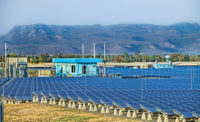World Bank To Help Developing Nations Meet Climate Pledges
The World Bank says it will help developing countries add 30 gigawatts of renewable energy by 2020 and, over the next five years, quadruple funding to make transportation systems more resilient to climate change.
The International Finance Corp. (IFC), a member of the World Bank Group, announced that it plans to expand its climate investments, to $3.5 billion a year from the current $2.2 billion annually, and lead on leveraging an additional $13 billion annually in private-sector financing by 2020.
As well as its own financing, the World Bank also intends to mobilize $25 billion in commercial financing for clean energy over the next five years.
World Bank officials add that, with the support of its members, the action plan is on target to meet its commitment—announced in October—to increase climate financing to potentially $29 billion by 2020.
The commitments are part of the World Bank’s Climate Change Action Plan, announced on April 7, which aims to help developing countries deliver on their national climate plans, submitted for the climate pact reached at the so-called COP21 meeting in Paris in December. “Developing countries want our help to implement their national climate plans, and we’ll do all we can to help them,” said World Bank Group President Jim Yong Kim in a statement.
“We are moving urgently to help countries make major transitions to increase sources of renewable energy, decrease high-carbon energy sources, develop green transport systems and build sustainable, livable cities,” he said.
World leaders will be in New York City on April 22 to sign the Paris climate agreement, which calls for a cap on global warming to between 1.5°C and 2°C. As part of the climate agreement, 140 countries have developed national climate plans, known as National Determined Contributions, to limit or reduce carbon emissions.
According to John Roome, senior director for climate change at the World Bank Group, funds will be directed to "where support is most needed," including disaster preparedness and coastal protection.




